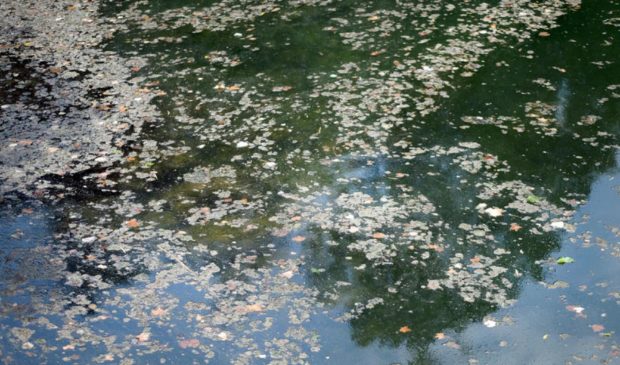Photo by Jorge Sanhueza-Lyon/KUT. Toxic algae found at Red Bud Isle in 2018.
The dog-killing algae in Lady Bird Lake is back
Monday, June 13, 2022 by
Andrew Weber, KUT Toxic blue-green algae has once again been detected in Lady Bird Lake.
The city says it’s working to stifle the blooms that killed a handful of dogs in 2019. Next week, staff will treat the water at Red Bud Isle and on the northern banks of Lady Bird Lake east of Interstate 35 with a nontoxic chemical that starves out the algae.
The algae contains a potent neurotoxin that can kill dogs and other animals. The city is warning pet owners to avoid the affected areas and to make sure dogs who go in the water don’t lick their fur before rinsing off. The toxin can cause headaches, muscle weakness, nausea and even liver damage in humans, according to the Centers for Disease Control and Prevention.
On Monday and Tuesday, city crews will apply 30,000 pounds of Phoslock at each site. The cloudy chemical prevents the algae’s ability to absorb phosphorus – a key food source for the algae. The city says Phoslock is not harmful to the environment or humans.
The city is asking people on the water those days to avoid the barges staff will use to apply the chemical, adding that it will settle to the bottom of the lake within a few hours.
The treatments will cost $300,000.
The algae has plagued Austin for the last three years. It was first discovered at Red Bud Isle, where it killed several dogs. Austin’s hot and dry summers, combined with runoff from the Highland Lakes, create perfect conditions for the blooms. Cyanobacteria producing the neurotoxin in algal blooms flourishes in warm, stagnant water. It typically thrives in summers, then dies when waters cool down in the winter.
Austin has been testing along Lady Bird Lake since 2019. The city’s Watershed Protection Department began treating waters with Phoslock last year.
Crews will reapply the chemical later this summer.
This story was produced as part of the Austin Monitor’s reporting partnership with KUT. This story has been changed since publication to correct information about the algae.
The Austin Monitor’s work is made possible by donations from the community. Though our reporting covers donors from time to time, we are careful to keep business and editorial efforts separate while maintaining transparency. A complete list of donors is available here, and our code of ethics is explained here.
You're a community leader
And we’re honored you look to us for serious, in-depth news. You know a strong community needs local and dedicated watchdog reporting. We’re here for you and that won’t change. Now will you take the powerful next step and support our nonprofit news organization?



